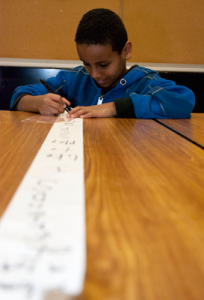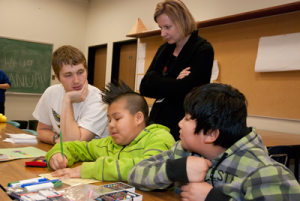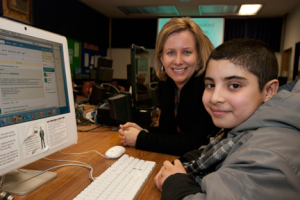“The Best Thing to Ever Happen in My Life”
CANU and the U of M collaborate to offer an innovative afterschool program for Winnipeg students
Every Tuesday from October 2011 through March 2012 a school bus filled with eager grade 5 & 6 students was welcomed to the University of Manitoba, Fort Garry Campus. The students participated in an after-school program called CANU and were greeted by CANU hosts Rita Courchaine, Office Manager for the Faculty of Education, and Jessica Stewin, a Teacher Candidate in the Faculty of Education.
CANU is an innovative mentoring and leadership program for Winnipeg children who live in challenging situations. Together, CANU and the Faculties of Kinesiology and Recreation Management, Human Ecology, and Education planned a program that included nutrition, fitness and sport, and literacy, while inviting them to explore the possibilities of a post-secondary education. This year 34 students participated from four schools: Sister MacNamara, Dalhousie School, Shaughnessy Park, and William Whyte.
CANU director, Roger Berrington describes CANU as the “University of CAN.” The decision to hold CANU on a university campus was decided in part because Roger saw a need to demonstrate and instill in the children that they can be successful and attend a post-secondary school if they want to. And by providing children with caring mentors and role models who believe in the potential of all children, Roger believes that students in CANU will learn to achieve their goals.
Roger explains that, “CANU mentors inspire, encourage, and challenge the CANU participants to dream, set goals and work towards achieving them. Mentors must have a desire to not only make a difference in the lives of children and grow their leadership and mentoring abilities, but must also be willing to have their own assumptions and values challenged.”
The Faculty of Education provided a Literacy Club for the students of CANU that focused on visual literacy by engaging students in the art of viewing and representing through digital photography and writing. This portion of the CANU experience was led by Faculty of Education, Assistant Professor, Dr. Michelle Honeyford. Dr. Honeyford explains that “The Literacy Club takes an inquiry-based approach to learning. Each week, students participate in a quest posted on the Literacy Club website which they complete in collaboration with their U of M volunteer partners. Through the quests, CANU participants are learning about visual literacy.”
The Literacy Club was designed to connect all aspects of the CANU experience for the children so they could see how learning happens when they play soccer, participate in a track and field event, cook a meal, and create art. It also supported a commitment to developing a program that builds on the cultural and linguistic diversity of the students in CANU. Dr. Honeyford explains that “Research has shown that for language and literacy learning to occur, we need to create interpersonal spaces where students’ identities are affirmed and their cultural knowledge and language abilities are considered valuable resources. We also know that arts-based programs engage students in expressing their thoughts and idea, developing thinking and problem–solving skills, using their imaginations, taking risks in their learning, and collaborating and sharing what they have learned with others.”
The Literacy Club program used digital photography as a form of active learning. Each week CANU students worked hands-on with the cameras to create, edit, and reflect on their images. The work required the students to interact with their partners and peers. “These interactions cause the students to learn about themselves and others,” explains Dr. Honeyford. “Photography emphasizes important concepts like ‘point-of-view,’ as the students make decisions about positioning the camera, composing an image, and framing a picture. This has benefits for all students, in particular for visual learners, and those learning English as a new language. Through photography students can see value in their perspectives, make creative connections between the art form and their lives, and communicate to others.”
CANU is still a new program, having only completed its second year; however CANU students and mentors have both gained a lot from its existence. Grade 6 CANU student Mohammad has participated both years and explains that: “CANU is the best thing to ever happen to me in my life.” And like other CANU participants, Mohammad says he benefited from the learning experiences, nutrition, the role models, physical and creative activities CANU offered, and the friends that he made. Mohammed added that, “If the program was available to grade 7 and 8 students I would come back.”
For more information visit the CANU website: www.canucanada.org










Pingback: Faculty of Education » From Volunteer to Teacher » Faculty of Education
Pingback: Faculty of Education » After-school Literacy Club Embraces Digital Technologies and Learning » Faculty of Education